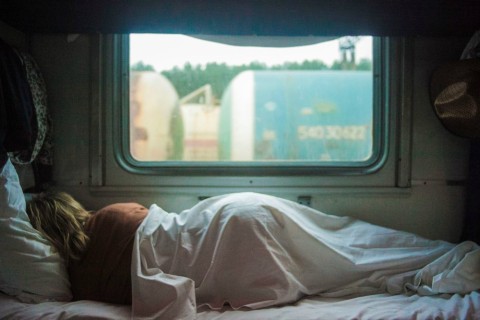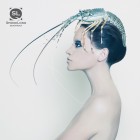In Camperland, we wake up early. The traffic starts before sunrise, all those people speeding down PCH from Malibu or the Valley to go to work, the endless hamster wheel, dad says. Britt and I sleep in the bed that converts to a table during the day; Mom and Dad sleep in the small bedroom in the back. Sometimes, when I can’t sleep, I sit in the driver’s seat, looking at the rear of the camper parked in front of us, the bikes strapped on, gingham curtains closed. We’re parked on the side of PCH, sandwiched between the highway and the base of a cliff covered with netting to prevent it from crumbling. Across PCH is the beach and the Pacific Ocean, spread blue and glittery in the sun. Million dollar view, baby! Dad always says.
In Camperland, Mom drives Dad in the pick-up to his job, where he waits on a corner in front of a hardware store. We make our bed into the table, carefully set on top one of Mom’s Lladro figurines from the box stored in the cabinet under the seat cushions. Before Mom got sick and then got better, before Dad got laid off, when we only used the camper for vacations, the figurines stood above our fireplace. We dress and then Mom comes back, makes us breakfast, assesses our clothes. We must always be clean and neat, she says. She takes us to the school where the kids have iPhones and clothes that aren’t from Out of the Closet or Council Thrift. Our lunches are free.
In Camperland, the police sometimes ask us to move. No overnight parking, they tell us. People on top of the hill complained, they say. They are worried about fire. A soft-faced policeman wants to make sure that we are going to school, that we have enough to eat. Mom’s face is red. We move to Topanga Canyon or to the Valley or Venice. Dad knows all the spots, all the other camperlands. And then we move back.
In Camperland, we lie in Dad and Mom’s bed, cover ourselves with the striped afghan someone gave Mom when she was sick. We poke our fingers through the loose weave. The stripes are green-blue and gray-blue, the same colors as the ocean. Mom teaches us how to make origami boats and dolphins and crabs and we swim them through the folds of the afghan. We swim them through Mom’s dark hair. We’re glad her hair grew back. Our fingers tangle in the strands.
Dad tells us: Don’t cross PCH alone. Don’t go into anyone else’s camper without letting me know. Especially that woman who always has strange men over. And that man in the above-the-pick-up camper who lives alone. He’s a methhead. Mr. Gonzalez is OK. Avoid the man who talks to himself and lives in the tent halfway up the hill under the brush. Don’t play, don’t walk, don’t do anything near PCH. Only play at the base of the hill right in front of our camper.
In Camperland, we do homework at the table, under the eyes of the Lladro figurine we’ve set out that day. The girl with the goose, the angel, the woman with the baby. All those figurines look like ghosts. Mom helps us with math and tests us on vocabulary. Mom can multiply large numbers in her head, loves things which I think should not be loved, things I don’t understand, like calculus, imaginary numbers. She tells us that pi is a number that never ends, goes into infinity. I try to count to infinity.
One night we wake when someone shouts Fire. Out the window facing the hillside, we see orange flames sear the brush and race up the hill. Our faces are stained eerily in the light of the fire, the inside of the camper reflects all yellow and red like a sunset. Dad and Mr. Gonzalez beat flames with the blankets Mom and Dad once brought from Mexico. Mom jumps in the front seat of the camper and we’re off, Britt and me in our pajamas, jostling as she drives. Dad meets us later with the pick-up. He left Camperland just as the firemen showed up. When we return, Mr. Gonzalez tells us that the fire was set by the guy in the tent, sparks blown from his cooking fire into the brush. The hillside is charred black and white.
Britt is restless. She’s going to middle school next year, wants to paint her nails like her friends show her on Instagram tutorials. She wants a satin jacket patterned with flowers. She gets in trouble for talking to the guy at Primo’s, the lunch truck that parks behind the campers. She wasn’t flirting, I hear Dad telling Mom, but he was.
In Camperland, after the fire, the police come. We’re doing our homework, the Lladro angel smiling above us. Mom with her long hair tied into a knot. There are four of them, hands resting on holsters; they tower above us as they crowd between the kitchen counter and our table. You need to move now, they say. Can the kids just finish their homework, can we just feed them? Mom says. Time to go, they say. You’ve had a long streak here. One officer swipes his arm across the table. No. 2 pencils roll. The angel tumbles to the floor. Pale blue shards next to black-booted feet.
In Camperland, I watch the clouds creep over the ocean onto the land. In the clouds, I see houses built on cul-de-sacs, lemon trees in front yards, play structures in the back. Some of the houses are big, with columns and fountains in the front and large windows like open eyes. Some are small with only one-car garages. Then the clouds flatten, sink into canyons, blow away beyond the hills. I close my eyes. Count to infinity.



 The core workshop of SmokeLong Fitness is all in writing, so you can take part from anywhere at anytime. We are excited about creating a supportive, consistent and structured environment for flash writers to work on their craft in a community. We are thrilled and proud to say that our workshop participants have won, placed, or been listed in every major flash competition. Community works.
The core workshop of SmokeLong Fitness is all in writing, so you can take part from anywhere at anytime. We are excited about creating a supportive, consistent and structured environment for flash writers to work on their craft in a community. We are thrilled and proud to say that our workshop participants have won, placed, or been listed in every major flash competition. Community works.